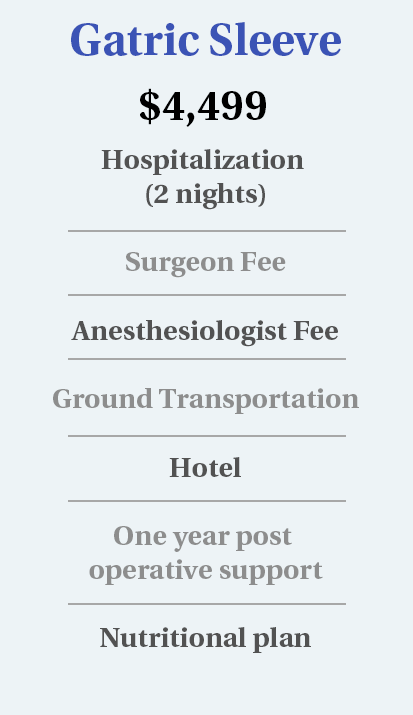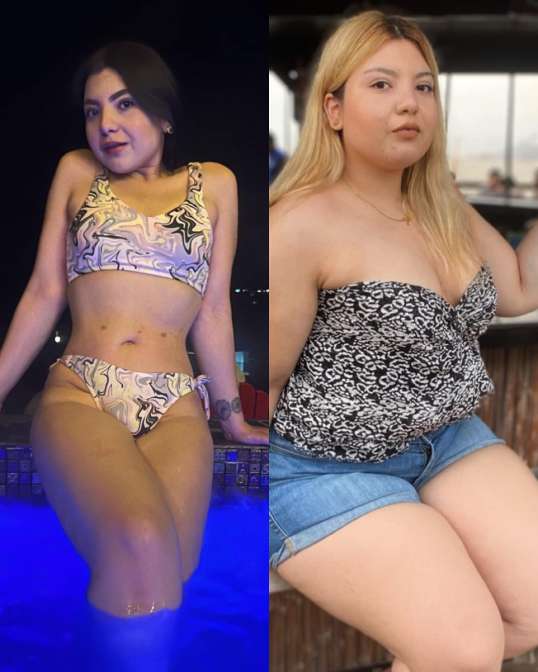
Top Board Certified bariatric surgeons in Tijuana, México.
What is a Gastric Sleeve?
A Vertical Sleeve Gastrectomy, commonly known as a Gastric Sleeve is one of the most common bariatric procedures today.1 Is a restrictive type of Weight Loss Surgery that permanently reduces the size of the stomach, thereby limiting food intake as well as the sensation of hunger.
Gastric sleeve is performed laparoscopically and the surgeon removes approximately 80 percent of the patient’s stomach, leaving only a tube (or “sleeve”) for the new and smaller stomach pouch. The new stomach is then stapled, and the small intestine is left intact. As the removed portion of the stomach is where the hunger-stimulating hormone ghrelin is produced, the Gastric Sleeve not only limits the amount of food, but also relieves you from the Hunger Sensation.

Why a Gastric Sleeve?
Embarking on a weight loss journey is a significant decision, and choosing the right bariatric procedure is crucial. Gastric Sleeve, also known as sleeve gastrectomy, stands out for several compelling reasons:
Sustainable Weight Loss:
Gastric Sleeve offers effective and sustainable weight loss by reducing the stomach’s size, restricting the amount of food it can hold. This results in controlled portion sizes and long-term weight management.
Reduced Hunger Hormones
The procedure involves the removal of a portion of the stomach responsible for producing hunger-inducing hormones. With diminished ghrelin levels, patients often experience a reduced appetite, supporting successful weight loss.
Minimal Nutrient Impact
Unlike some other bariatric procedures, Gastric Sleeve preserves the natural digestive process. This means nutrients are absorbed efficiently, minimizing the risk of nutritional deficiencies and supporting overall health.
Improved Metabolic Health
Beyond weight loss, Gastric Sleeve has shown positive effects on metabolic conditions such as type 2 diabetes and hypertension. Many patients experience significant improvements or remission in these health conditions post-surgery.
Lower Risk of Complications
Gastric Sleeve is considered a relatively safe and straightforward procedure with a lower risk of complications compared to some other bariatric surgeries. It provides effective outcomes with a reduced chance of postoperative issues.
Customized to Your Needs
The procedure is adaptable to individual needs, allowing for personalized adjustments. Whether you’re aiming for significant weight loss or addressing specific health concerns, Gastric Sleeve can be tailored to meet your unique goals.
Positive Impact on Quality of Life
Patients often report an enhanced quality of life after Gastric Sleeve surgery. Beyond physical benefits, the procedure can boost self-esteem, increase energy levels, and foster a more active and fulfilling lifestyle.
In choosing Gastric Sleeve, you’re opting for a proven and versatile solution that not only addresses weight loss but positively impacts various aspects of your overall well-being. Our team at My New Body Obesity Center is dedicated to guiding you through this transformative journey with expertise, compassion, and a commitment to your long-term health.
Patients Testimonials
Gastric Sleeve Frequently Asked Questions
On average people can expect to lose around two to four pounds a week, or eight to 16 pounds a month, for the first six to 12 months following their gastric sleeve surgery.
The main advantage of gastric sleeve surgery is that it does not need to create a new connection between the stomach and small bowel (anastomosis). Long term complications are less likely to occur with the gastric sleeve procedure than they are with gastric bypass surgery. The chance of nutrient deficiency is also less likely with the gastric sleeve surgery than with gastric bypass surgery because there is no malabsorption.
The main advantage of gastric sleeve surgery is that it does not need to create a new connection between the stomach and small bowel (anastomosis). Long term complications are less likely to occur with the gastric sleeve procedure than they are with gastric bypass surgery. The chance of nutrient deficiency is also less likely with the gastric sleeve surgery than with gastric bypass surgery because there is no malabsorption.
Gastric sleeve recovery time depends on your condition and procedure. If you have gastric sleeve — also known as sleeve gastrectomy — you can usually return home the second day after surgery. Most people return to work or other daily routines in 5 to 10 days.
Patients Results



